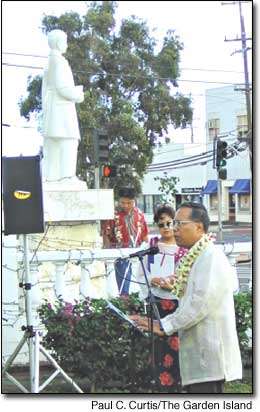LIHU’E — The message is be proud of your heritage, whatever it is.
Though the delivery venue of the message was the annual tribute to Philippines national hero Dr. Jose Rizal on the lawn of the historic County Building yesterday, the thought transcends races, religions and ages.
“Learn your ancestry. Treasure your ancestry,” said Dr. Paul Flora, guest speaker.
“For this is the connection to the past.” Go to school, excel in school, “be whatever you want to be, and be proud of your accomplishments,” he said to the younger members of a crowd of around 80 people.
“Walk with your head high. Then the death of Dr. Jose Rizal is not in vain after all,” Flora said.
“He was just a man, not a king, not a prince,” so why is he revered and remembered? Flora asked.
Because he inspired a people to rise up against the oppression wrought by Spanish occupiers, and searched the world for proof to back up the Spaniards’ claims that the Filipino people were inferior to whites because of their straight, black hair, dark eyes and dark skin.
Many of the grandparents of those in attendance at yesterday’s function went to their graves believing the Spaniards’ claims, Flora bemoaned.
After Rizal, an educator, doctor, poet, author and inventor, returned to his native Philippines after traveling the world and not finding any supporting evidence for the Spaniards’ claims, he was immediately jailed.
Even in prison, his writings continued to fuel the fire of revolution that eventually saw the Filipino people rise up and overpower the Spanish occupiers, Flora said.
Flora encouraged all in attendance to read two of Rizal’s novels, written in Spanish but translated to be titled in English “Filibuster” and “Touch Me Not.”
They are recommended reading not to “embitter” people, but “to get a glimpse of the past,” Flora said.
On Dec. 30, 1896, or nearly 107 years ago to the day, Rizal was shot to death by Filipinos forced to fire on him for fear that they themselves would be assassinated by Spanish soldiers immediately behind them, Flora continued.
“We stand tall and proud of being Filipino,” said Flora, in front of the Rizal statue erected on the lawn of the historic County Building during the terms of former Mayor Eduardo E. Malapit, Kaua’i’s only mayor of Filipino ancestry.
“He must have done some very, very special things to be remembered more than 100 years after his death,” said Mayor Bryan J. Baptiste, one of many elected officials gathered for the ceremony.
Rizal could have been the world’s first promoter of ecotourism, Baptiste said, and peacefully fought until his death for the freedom of the Filipino people.
“Carry on the dream of Rizal,” Baptiste encouraged those in attendance.
The Kauai Filipino Women’s Club hosts the annual tribute, which this year included musical selections, and a special reading of one of Rizal’s last writings, “My Last Farewell.”
Young people Allen Iloreta, Raquel Tambio, Ruthchelle Melchor, Amanda Mayer, Diana Galicinao, Erin Navarro and Keila Curtis took turns reading portions of Rizal’s farewell, translated to English from Spanish.
Associate Editor Paul C. Curtis may be reached at 245-3681 (ext. 224) or mailto:pcurtis@pulitzer.net.


